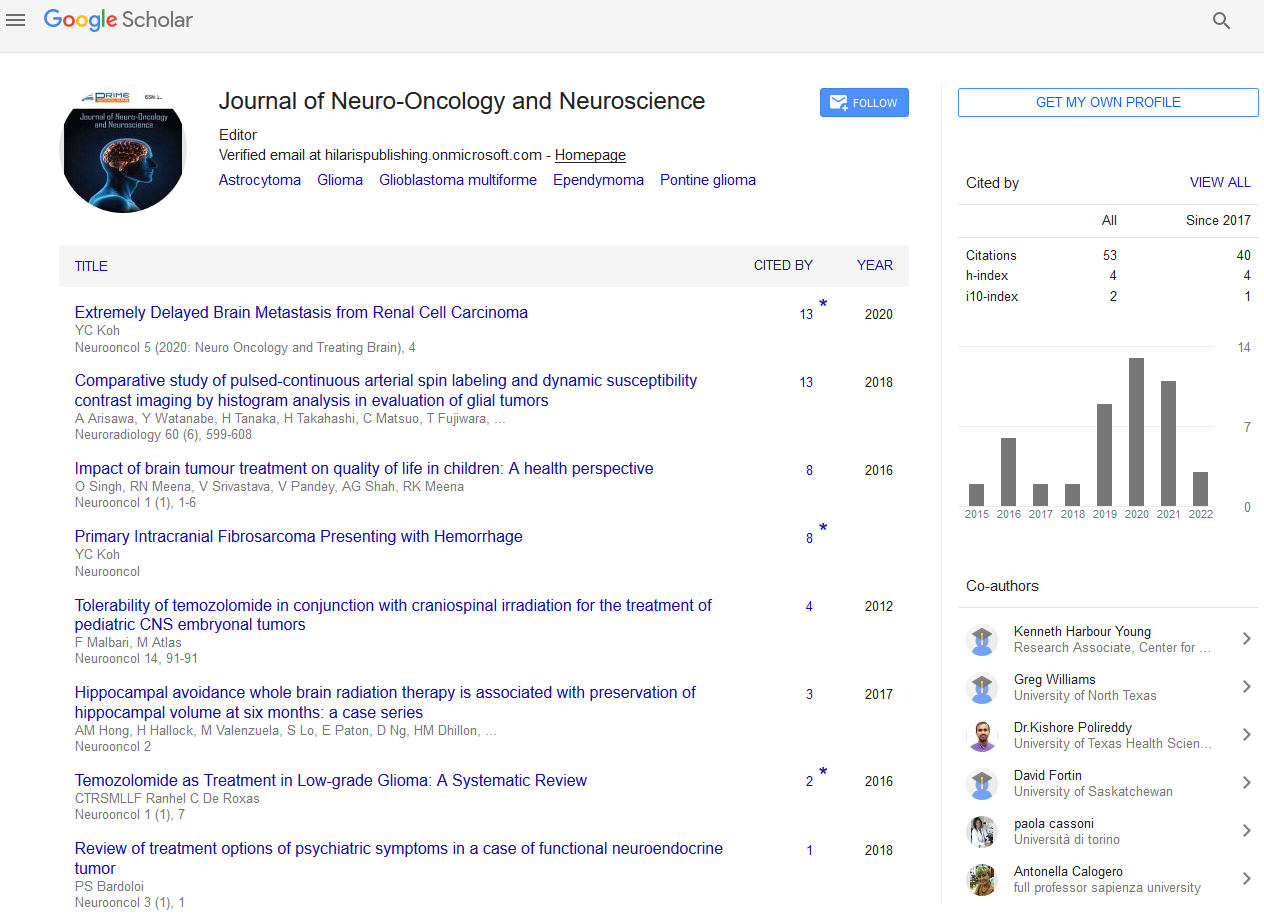Perspective Article - (2023) Volume 8, Issue 3
Navigating the Neurocognitive Terrain: Understanding the Implications of Brain Tumor Surgery and Treatment
Alan Fernandes*
Department of Clinical Neurosciences, Lausanne University Hospital, Switzerland
*Correspondence:
Alan Fernandes,
Department of Clinical Neurosciences, Lausanne University Hospital,
Switzerland,
Email:
Received: 30-Aug-2023, Manuscript No. IPJNO-24-19612;
Editor assigned: 01-Sep-2023, Pre QC No. IPJNO-24-19612 (PQ);
Reviewed: 15-Sep-2023, QC No. IPJNO-24-19612;
Revised: 20-Sep-2023, Manuscript No. IPJNO-24-19612 (R);
Published:
27-Sep-2023, DOI: 10.21767/2572-0376.8.3.27
Introduction
The diagnosis and treatment of brain tumors pose significant
challenges not only to physical health but also to cognitive
function and overall quality of life. Neurocognitive impairment
is a common consequence of both the tumor itself and the
various treatment modalities employed, including surgery,
radiation therapy, and chemotherapy. Understanding the
neurocognitive implications of brain tumor surgery and
treatment is essential for optimizing patient care, promoting
recovery, and enhancing long-term outcomes. Neurosurgical
procedures can disrupt normal neuronal circuits, leading
to deficits in cognitive domains such as memory, language,
attention, and executive function. The extent and location of
tumor resection, as well as the surgical approach employed,
play significant roles in determining the severity and nature of
postoperative neurocognitive deficits.
Description
Intraoperative neuro-navigation and neurophysiological
monitoring techniques help neurosurgeons minimize damage to
eloquent brain areas during surgery, thereby reducing the risk of
postoperative neurocognitive impairment. Additionally, awake
craniotomy with intraoperative cortical mapping allows for
real-time assessment of cognitive function, enabling surgeons
to preserve essential brain regions while maximizing tumor
resection. Despite these advances, neurocognitive deficits
may still occur, particularly in cases where tumor infiltration
into eloquent brain regions necessitates subtotal resection or
when surgery is combined with adjuvant therapies. Adjuvant
therapies such as radiation therapy and chemotherapy are
commonly employed following brain tumor surgery to target
residual tumor cells and prevent disease recurrence. However,
these treatments can also have neurocognitive sequelae,
either acutely during treatment or delayed over time. Radiation
therapy, in particular, can lead to radiation-induced cognitive
decline, characterized by progressive deficits in memory,
attention, processing speed, and executive function. Similarly,
certain chemotherapeutic agents, such as methotrexate and
cisplatin, have been associated with cognitive dysfunction,
including impaired attention, learning, and information
processing.
The neurocognitive effects of brain tumor treatment are
further compounded by other factors such as tumor type,
tumor location, patient age, preexisting comorbidities, and
genetic predisposition. Pediatric patients, whose brains are
still developing, are particularly vulnerable to the neurotoxic
effects of treatment, which can have profound and longlasting
implications for cognitive function and academic
achievement. Similarly, elderly patients may experience
age-related cognitive decline exacerbated by the neurotoxic
effects of therapy, leading to functional impairment and
reduced quality of life. Despite these challenges, several
strategies can help mitigate neurocognitive impairment and
promote cognitive rehabilitation in patients undergoing brain
tumor surgery and treatment. Multidisciplinary approaches
involving neurosurgeons, neurologists, neuropsychologists,
and rehabilitation specialists are essential for comprehensive
assessment and management of neurocognitive deficits.
Preoperative neurocognitive testing can establish baseline
function and identify areas of vulnerability, allowing for
targeted interventions and personalized treatment plans.
Moreover, cognitive rehabilitation programs focusing on
cognitive exercises, compensatory strategies, and adaptive
technologies can help patients regain lost function and
improve overall cognitive performance. These programs may
include cognitive training exercises targeting specific cognitive
domains, psychoeducation to enhance awareness and coping
skills, and environmental modifications to support independent
living and community reintegration.
Conclusion
The neurocognitive implications of brain tumor surgery and
treatment are significant and multifaceted, affecting various
cognitive domains and functional abilities. Understanding the
risk factors, mechanisms, and interventions associated with
neurocognitive impairment is essential for optimizing patient
care and promoting long-term recovery. By adopting a holistic
approach that addresses the physical, cognitive, emotional,
and social aspects of brain tumor management, we can
enhance the quality of life and well-being of patients facing
these challenging diseases.
Citation: Fernandes A (2023) Navigating the Neurocognitive Terrain: Understanding the Implications of Brain Tumor Surgery and Treatment. Neurooncol. 8:027.
Copyright: © 2023 Fernandes A. This is an open-access article distributed under the terms of the Creative Commons Attribution License, which permits unrestricted use, distribution, and reproduction in any medium, provided the original author and source are credited.

